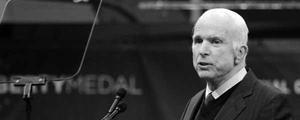Since August, a majority of Americans have fairly consistently said the United States made a mistake in sending troops to Iraq. By now, it is well established that Democrats and Republicans have starkly different views of the war in Iraq -- the vast majority of Republicans support the war, and Democrats are overwhelmingly opposed.
Historically, Gallup has asked the same "mistake" question about other U.S. military engagements, starting with the Korean War. This history allows for an analysis of whether past wars divided the public along party lines as the Iraq war does, or if people viewed these other wars similarly regardless of their party affiliation.
Gallup Poll data from late September through October underscore just how divided Americans are politically about the Iraq war*. Eighty-one percent of Democrats say the United States made a mistake in sending troops there, while 78% of Republicans say it did not. Independents, as is typical, fall in between -- but a majority of independents, 58%, believe the United States made a mistake.
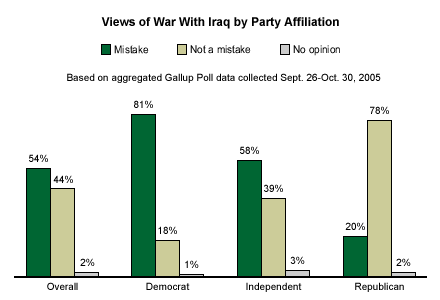
The current popular perception is that Republicans are more inclined to support the use of military force than are Democrats, and thus should be more likely to support U.S. involvement in war. That general tendency could be complicated, however, if a Democratic president is the one who is arguing in favor of military action.
The Vietnam and Korean Wars present good tests of the link between party affiliation and support for wars historically. Both war efforts were primarily led by Democratic presidents -- Harry Truman and Lyndon Johnson -- and both efforts were, as the Iraq war is now, not wholly embraced by the general public.
Vietnam War
Gallup began asking the "mistake" question about the Vietnam War in 1965. Similar to the current war in Iraq, initial opinion was favorable toward U.S. involvement in the war effort, but by 1968 more Americans were saying the United States made a mistake sending troops to Vietnam than were saying it did not. Once opinion reached that tipping point, it never recovered.
However, the Vietnam War was different from the Iraq war in that opinions were not strongly related to party affiliation. Aggregated Gallup data from August 1968 to September 1969 showed an average of 53% of Americans saying the United States made a mistake in sending troops to Vietnam, similar to the recent 54% average for the Iraq war. But a majority of Democrats, independents, and Republicans said the war was a mistake. In fact, there is little differentiation in the results by party -- 51% of Democrats, 55% of independents, and 56% of Republicans thought the United States made a mistake in going to Vietnam during that period. (The lack of partisan differences is evident in each of the four individual polls included in the aggregate, even though the presidency changed hands from Democrat Johnson to Republican Richard Nixon during that time.)
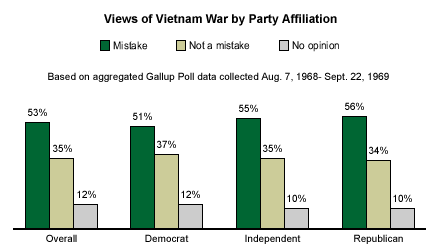
Korean War
Gallup first asked about U.S. involvement in the Korean War in August 1950. Again, more Americans were supporting U.S. efforts at that time than not. The trend line on the mistake question during the Korean War, however, is very different from that for the Vietnam War. During the Korean War, support vacillated, with support outpacing opposition at certain times and the reverse being true at others.
Because of that, it is harder to combine data over time to get a read on support for the war by party. However, this analysis will look at two time points -- February 1951 and February to March 1952, when opposition to the war was higher than support, and similar to what it is now for the Iraq war.
The data from February 1951 show a partisan division -- with 55% of Republicans calling U.S. involvement in Korea a mistake, compared with 43% of Democrats***. Fifty-one percent of independents thought the United States made a mistake at that time.
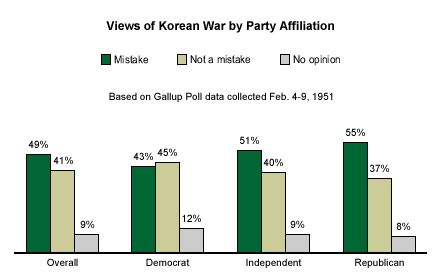
Over a year later****, a partisan gap was evident, and was somewhat larger, as 61% of Republicans and 44% of Democrats thought the United States made a mistake in sending troops to Korea.
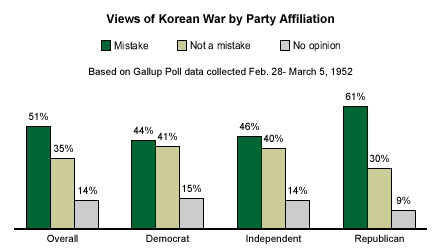
Persian Gulf War
Unlike the three wars discussed, the 1991 Persian Gulf War with Iraq was won swiftly by the United States. As such, opposition to that war was never that high. But an analysis of Gallup data from early January (before the actual war began) showed a majority of both Republicans and Democrats supported the war, but Republicans were significantly more likely to do so.
Bottom Line
Historical Gallup Poll data show the current pattern of war support is not necessarily typical, compared with other lengthy wars involving U.S. troops. While there was a partisan divide during the Korean War, it was not nearly as pronounced as the division for the current war in Iraq. Democrats were more likely to support that war, while Republicans are more likely to support the current war. Also, Americans' views of the United States' role in the Vietnam War were not related to their political leanings in any meaningful way.
One possible explanation for the change is that the parties tend to be more homogeneous today than in the past. In the 1950s and 1960s, conservative Democrats dominated the South. So the party was made up of conservative Southerners and moderates and liberals from other parts of the country. Since that time, the Republican Party has made significant inroads into the South in both party identification and in winning elections. Additionally, the Republican Party of the 1950s and 1960s was not as monolithically conservative as it is now.
*Results are based on 2,626 interviews with nationally representative samples of adults, age 18 and older, conducted in polls Sept. 26-28, Oct. 21-23, and Oct. 28-30, 2005. For results based on this combined sample, the maximum margin of sampling error is ±2 percentage points. This includes samples of 888 Republicans, 872 independents, and 848 Democrats. All have maximum margins of sampling error of ±4 percentage points.
**Results are based on 6,089 interviews with nationally representative samples of adults, age 18 and older, conducted in polls Aug. 7-12, 1968, Sept. 26-Oct. 1, 1968, Jan. 23-28, 1969, and Sept. 17-22, 1969. For results based on this combined sample, the maximum margin of sampling error is ±1 percentage point. This includes samples of 1,767 Republicans, 1,808 independents, and 2,373 Democrats. The Republican and independent samples have maximum margins of sampling error of plus or minus three percentage points; the Democratic sample has a maximum margin of sampling error of ±2 percentage points.
***Results are based on 1,403 interviews with a nationally representative sample of adults, age 18 and older, conducted Feb. 4-9, 1951. For results based on this sample, the maximum margin of sampling error is ±3 percentage points. This includes samples of 479 Republicans, 338 independents, and 563 Democrats. The Republican and Democratic samples have maximum margins of sampling error of ±5 percentage points; the independent sample has a maximum margin of sampling error of ±6 percentage points.
****Results are based on 1,922 interviews with a nationally representative sample of adults, age 18 and older, conducted Feb. 28-March 5, 1952. For results based on this sample, the maximum margin of sampling error is ±3 percentage points. This includes samples of 575 Republicans, 456 independents, and 737 Democrats. The Republican and independent samples have maximum margins of sampling error of ±5 percentage points; the Democratic sample has a maximum margin of sampling error of ±4 percentage points.
